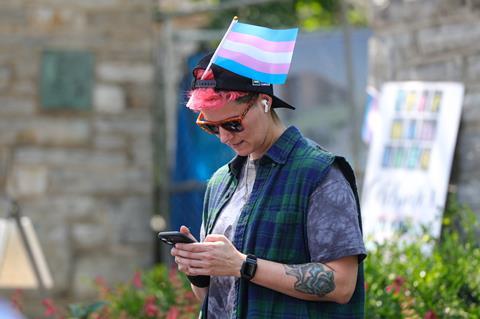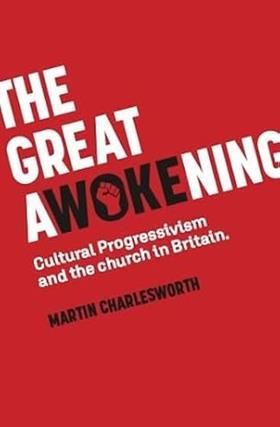Recent years have seen sudden adoptions of moral causes, often on contentious issues such as gender identity. Martin Charlesworth calls it The Great Awokening and says Christians should be wary of it

Something rather strange has kept happening over the past decade – a sudden, widespread and intense focus on specific moral issues has arisen several times with almost no warning.
Social media suddenly became awash with innumerable voices signalling their support for the particular moral concern of the moment. Those who dissented risked facing an intense social media shaming – with potential long term consequences for them.
Does this ring a bell?
Let me give you an example.
In 2015 there was a sudden and intense advocacy of transgenderism. Why was this? The evidence suggests that the UK followed social trends in the USA where a long standing media personality had just hit the headlines with a story of intense gender dysphoria leading to a full transition from a past as Bruce Jenner, a famous Olympic athlete, to becoming a trans woman - Caitlyn Jenner.
Jenner emerged as a key transgender social media celebrity who happened also to be linked to the Kardashian family. The subsequent wave of trans-affirming social media signalling in north America swept across the Atlantic. In the UK there was a sudden desire to be on the ‘right side of history’ as huge numbers rushed onto social media to indicate their trans-affirming progressive outlook. What followed was very significant. Between 2015-2020 there was a huge institutional and cultural change as trans-affirming policies were widely adopted across government, education, health care, business and media. Transgenderism had become mainstream quite suddenly.
This is what I mean by a ‘moral panic’ – a sudden adoption of a moral cause across wide swathes of society largely through the medium of social media and triggered by a key event.
There are positive aspects to these moral panics, which can highlight issues of real social importance. However, those who swiftly adopted these causes did not fully know what they were buying into
An even bigger moral panic took place in 2020 in the aftermath of the tragic death of African-American George Floyd on the streets of Minneapolis, USA, at the hands of white policemen. The images went viral and elicited spectacular levels of online support across the world – and very notably in the UK. BLM demonstrations took place here, statues were toppled, people started ‘taking the knee’ and ‘anti-racism’ became a significant cultural focus.
These moral panics have a number of things in common. Firstly, they were all triggered by a dramatic key event. Secondly, they all struck a moral chord with the general public. There was wide agreement that an important moral issue was at stake in each case – respectively ‘transphobia’ and ‘racism’ Thirdly, the key events were rapidly and exponentially promoted by social media. Fourthly, public support for these causes was mostly in the form of ‘virtue signalling’ on social media rather than meaningful activism. Fifthly, in each case there were pressure groups which capitalised on the opportunity of a sensational event to promote their causes on a far wider basis. Sixthly, these moral panics all led to the establishment of these causes firmly in mainstream culture and even, to some extent, in public policy.
One really striking factor which emerges from all this is the sheer power of social media to shape our perceptions and thinking. Platforms such as Facebook, Instagram, Tik-Tok and X are ideal for propagating moral ideas instantaneously to vast numbers. Sharing options and algorithms do the work. Posts about key social issues can go viral very quickly. Equally, dissidents can be cancelled overnight. Social media provides little room for reasoned debate and careful reflection. Virtue signalling has become a cultural habit. Widespread moral panics, as I describe them, are only really possible in a world saturated by social media.
In my new book, The Great Awokening, I argue that these and other similar moral panics had a positive aspect and highlighted issues of real social importance. However, I also argue that those who swiftly adopted these causes did not fully know what they were buying into. This is because the pressure groups involved were not merely arguing for a further application of generally accepted socially liberal ideas. On closer examination we can see that they were all proponents, in differing ways, of various versions of Critical Theory – an ideology which combines elements of Postmodernism and Neo-Marxism. Critical Theory has introduced us to such ideas as the ‘social binaries’ of oppression and the so-called matrix of oppression known as ‘intersectionality’. During the past decade many Christians have adopted these and other related concepts.

Critical Theorists believe that all relationships are based on power. There are always ‘oppressors’ and the ‘oppressed’. They see social power as falling on one side of such binaries as male/female, white/black, straight/gay, cisgender/transgender. Critical Theorists like to link up these apparent power-based social categories into a single matrix of oppression and victimhood – known as ‘intersectionality’. But is this really an accurate description of the reality of life?
My book scrutinises these ideas biblically. In the scriptures a different perspective emerges. It turns out that human relationships cannot be reduced to power dynamics alone. Furthermore, the so-called ‘social binary’ categories of Critical Theory are not central to the biblical perspective. Rather than the ‘identity’ focus of Critical Theorists, we find a relentless focus on wealth and poverty as the defining issue in biblical social justice.
The Great Awokening by Martin Charlesworth (Influence Resources) is available now




























4 Readers' comments